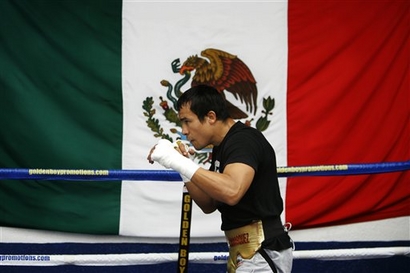Mexico is boxing’s promised land. The streets are empty whenever Julio Cesar Chavez Jr. and Saul Alvarez are fighting. Thousands of moustachioed men flood the streets to celebrate their victories. Little Mexican niños are given boxing gloves for their third birthday and are expected to not take them off until they turn pro at age 15, not even to go to the toilet. Boxing fills the sports pages and boxing gyms almost outnumber taco stands.
At least that’s the impression that you get when you read about Mexican boxing in the American boxing media. I live in Mexico and sadly, I’m here to report that it’s not true. Not even the bit about going to the toilet.
Yes, boxing is far more popular and mainstream here than it is north of the border. But American fans and commentators are under a few misapprehensions about the state of the sport down here. These observations are partly a response to that and partly the incoherent ramblings of a madman.
Bear in mind that these conclusions, such as they are, are based on nothing more than observation of my social circle, conversations with random people (mainly taxi drivers) and my own experience training in a couple of Mexican gyms. In other words, a rigorous and disciplined sociological survey with a huge sample size and a tiny margin of error…
Observation Uno – Mexican Boxing Fans Are Not Idiots
One of the most common assumptions made in the boxing media is that Mexican fans are blind to the flaws of middleweight Julio Cesar Chavez Jr. and junior middleweight Saul Alvarez, and would follow them off a bridge if they jumped (in a somewhat strained Mexican boxing star as pied piper analogy/situation). It’s undeniable that the dudes are popular, JCC Jr. mainly due to his name, but it’s more complicated than that. Their fans have no illusions that they’re world beaters. I was even accosted by the town drunk in small village in Veracruz the day after Saul Alvarez beat Lord Voldemort/Matthew Hatton, calling Alvarez a fraud. Both guys are just fun, Mexican fans know that. Surprisingly, most casual fans name lightweight champion Juan Manuel Marquez as their favourite fighter.
Observation Dos – Boxing Should Watch Its Back In Mexico
Earlier in the year, I was invited to a party with a bunch of Mexican guys to watch a George Saint Pierre UFC fight. No-one has ever invited me to a Juan Manuel Marquez party, even though I would enjoy said party. What I’m trying to say is that mixed martial arts is gaining ground with Mexicans. Boxing is still the more popular sport by far, but with a Mexican-American heavyweight champion and Mexico’s love for combat sports, it’s easy to see that changing.
Observation Tres – Boxing Is Better Promoted In Mexico
This is partly a function of boxing being more popular here, but it’s also a clear difference between Mexico and the U.S.A. When was the last time you saw a fight poster on a city street? Or on every city street for blocks? What about the last time you saw a pound-for-pound fighter on a talk show with their trainer, not during the build up to a fight? Yes, it’s a cycle of popularity and visibility – but those things would be easily achievable in the good old U.S. of A.
Observation Cuatro – Boxing IS Alive And Well In Mexico
Ok, despite everything I’ve said, boxing is doing pretty well in Mexico. It’s by no means the biggest sport (that’d be futbol) and it’s only borderline mainstream in terms of everyday sports coverage. But it’s still doing way better than it is in the U.S.A. My old gym, in a mixed middle class/poor neighbourhood, was always chock full of kids. Boxing is still part of the culture here, to a much greater extent than up north. It’s still on “network TV” regularly and it’s still a topic of water cooler conversation. Still, just like up north, boxing is going to have to fight to maintain its position in a competitive sports marketplace. Things aren’t as good for boxing down here as many would have you believe, but they ain’t that bad either.

